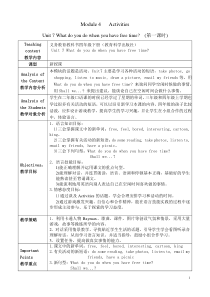 DOC
DOC
【文档说明】教科版英语四年级下册《Unit 7 What do you do when you have free time》教学设计5.doc,共(4)页,46.000 KB,由小喜鸽上传
转载请保留链接:https://www.ichengzhen.cn/view-146791.html
以下为本文档部分文字说明:
1Module4ActivitiesUnit7Whatdoyoudowhenyouhavefreetime?(第一课时)Teachingcontent教学内容义务教育教科书四年级下册(教育科学出版社)Unit7Whatdoyoudowhen
youhavefreetime?课型新授课AnalysisoftheContent教学内容分析本模块的话题是活动。Unit7主要是学习各种活动的短语,takephotos,goshopping,listentomusic,drawapicture,emailmyf
riends等。用Whatdoyoudowhenyouhavefreetime?来询问同学空闲时候做的事情,用Shallwe...?来提出建议。能谈论自己在空闲时间会做什么事情。AnalysisoftheStudents教学对象分析学生在二年级口
语课的时候已经学过了星期的单词,三年级和四年级上学期也学过很多有关活动的短语,可以以旧引新学习本课的内容。四年级的孩子比较活泼,应多设计游戏教学,提高学生的学习兴趣,并让学生在小组合作的过程中,体验语言。Objectives:教学目标1.语言知识目标:1)三会掌握课文中的新单词:free,fee
l,bored,interesting,cartoon,king。2)三会掌握有关活动的新短语:dosomereading,takephotos,listento,emailmyfriends,haveapicnic
。3)三会下列句型:Whatdoyoudowhenyouhavefreetime?Shallwe...?2.语言技能目标:1)能正确理解并运用课文的重点句型。2)能理解对话,并连贯朗读,语音、语调和停顿基本正确,基础好的学生能熟读甚至背诵课文。3)能流利地用英
语向别人表达自己在空闲时间喜欢做的事情。3.情感态度目标:1)通过谈及Activities的话题,学会合理安排学习和活动的时间。2)通过游戏激发兴趣、自信心和合作精神,能在语言技能实践的过程中逐步形成主动参与、乐于探索的学习态度。教学策略1.利用卡通人物Baymax、歌曲
、课件,图片等创设气氛和情景,采用大量游戏,故事等操练所学的内容。2.对话采用情景教学,寻找贴近学生生活的话题,引导学生学会看图听录音理解对话,从而学习语言知识。并适当指导,鼓励小组合作学习。3.设置任务,提高做真实事情的能力。ImportantPo
ints教学重点1.课文中的新单词:free,feel,bored,interesting,cartoon,king2.有关活动的新短语:dosomereading,takephotos,listento,emailmy
friends,haveapicnic3.新句型:Whatdoyoudowhenyouhavefreetime?Shallwe...?2DifficultPoints教学难点完成阅读理解,谈论自己的课外活动。TeachingAids/Media主要教学媒体电
脑、电视机、课件等。TeachingResources教学资源课件,图片,道具。Teachingprocess:Teachingprocess教学过程:Step1:Warmingup1.Singasong:Whatdoyoudoeveryday?【设计意图】通过唱歌曲,复习学过的动词
词组,为引入课题做铺垫。2.Freetalk.T:OnSaturdayandSunday,weusuallyhavefreetime.(Learnthenewwords“free”)【设计意图】热身,学习新词“free”,引入课题。3.Leadinthetopican
dtitle.T:Today,wewilllearnsomethingaboutwhatyoudowhenyouhavefreetime.Teachingprocess教学过程:Step2:Introductionandrevision
.1.Introduceacharacterandthebackgroundofthislesson.T:Today,Iwanttointroduceafriendtoyou.Doyouwanttoknow?Guesswhoheis.【设计意图】介绍学生喜爱的卡通人物Baymax,通
过猜测和观看视频,提高学生的学习兴趣。2.Game1:Sharpeyes.T:YouknowBaymaxusuallydoesmanyinterestingthingswhenhehasfreetime.Let'splayagametosee.【设计意图】通过游戏,复习旧的动词短语。T
eachingprocess教学过程:Step3:Presentationandpractice.1.Game2:GuessthephrasesaboutactivitiesT:Baymaxalsodoesotherinterestingthings.Doyouwanttokn
ow?3Youcanaskhim.Look,heiscoming.(ShowthetoyofBaymax.)Learnthenewsentence“Whatdoyoudowhenyouhavefreetime?”And
letpupilsguessbyusing“Iusually/sometimes/often/always„”【设计意图】让学生看相关活动的道具来猜测Baymax做的事情,通过游戏调动学生的积极性,在过程中用句型学习新的动词词组
。2.Readnewphrases.【设计意图】做动作读词组,小组合作巩固新词组。3.Game3:TPRgame【设计意图】教师读词组,学生做动作,检测学生是否掌握。4.Game4:Bomb-bombgame.【设计意图】再次复习新旧词组。通
过游戏,调动学生开口说英语的兴趣,检测学生的掌握程度。5.Talkaboutyourself.T:Baymaxdoessomanyinterestingthings.(Learnthenewword“interesting”.)T:Doy
oudotheseinterestingthingswhenyouhavefreetime?Whatdoyoudowhenyouhavefreetime?S1:Ialways/usually/often/sometimes/
„【设计意图】学生结合自己的实际,运用新的句型和短语表达。6.Setasituationandlearnthenewsentences“Ifeelbored.”and“Shallwe„?”.【设计意图】设置情景,教师扮
演Baymax,引导学生完成新句型的学习和操练。7.TellastoryaboutBaymax’sday.【设计意图】利用刚才学生猜对的短语,构成Baymax一天要做的事情。这些短语也是对话中将会出现的短语,为对话教学做铺垫。Teachingprocess教学过程:Ste
p4:Presentationandpractice(教师继续扮演Baymax)T:IhaveahappySunday.WhataboutJiaminandJanet?Whatdotheydowhentheyhavefreetime?Iwanttoknow.Let’slisten.1.L
istenandwriteT/F.4【设计意图】听力练习,整体了解对话内容。2.Repeatthedialogue.【设计意图】跟读对话,模仿语音语调。3.Readingroupsandcirclethewordsyoudon'tunderstand.【设计意图
】解释对话中的难点。4.Readinroles.5.Game5:Recitethedialogue.【设计意图】通过游戏,激发学生背书的兴趣。Teachingprocess教学过程:Step4:Sumup.Summarizeallthewordsan
dsentenceswehavelearntoday.Teachingprocess教学过程:Step5:DevelopmentandTask.1.Watchthepptaboutthedifferentlivesofdifferentchildren.【设计意图】视听了解
不同地区孩子的生活差异。2.Readingcomprehension.Fillintheformaccordingtothepassageandthenwriteaboutyourself.【设计意图】拓展知识,培养学生综合运用语言的能力。Teaching
process教学过程:Step6:Homework1.Listenandreadthenewwordsandthenhaveadictation.2.Fillintheblanksaccordingtothedialogue.3.
Searchinterestingactivitiesonthenet.(选做)4.Writing:WhenIhavefreetimeBlackboarddesign板书设计Unit7Whatdoyoudowhenyouhavefreetime?free
listento„WhatdoyoudowhenyouhaveMonkeyKingdosomereadingfreetime?interestingtakephotosIalways/usually/som
etimes„feelwatchcartoonsboredemailmyfriendsShallwe„?Metoo.haveapicnic
 辽公网安备 21102102000191号
辽公网安备 21102102000191号
 营业执照
营业执照